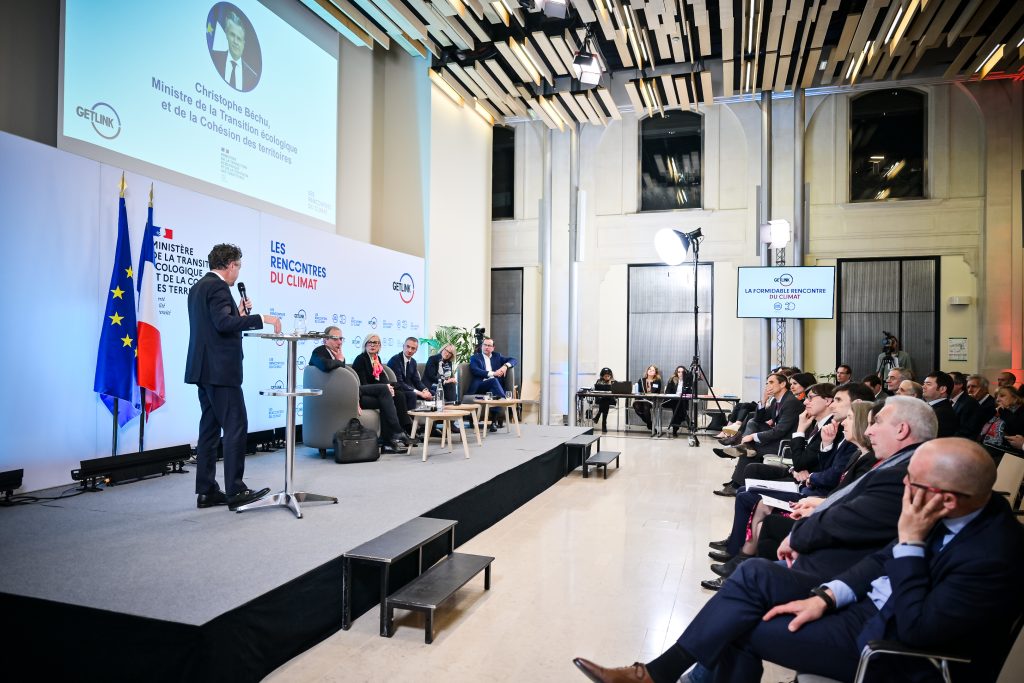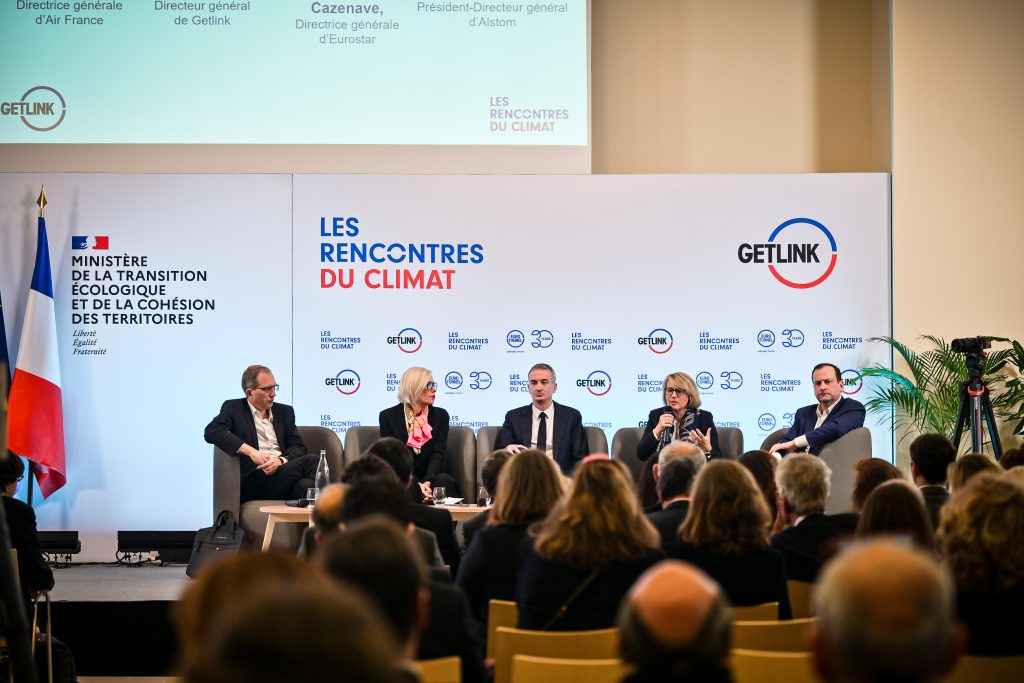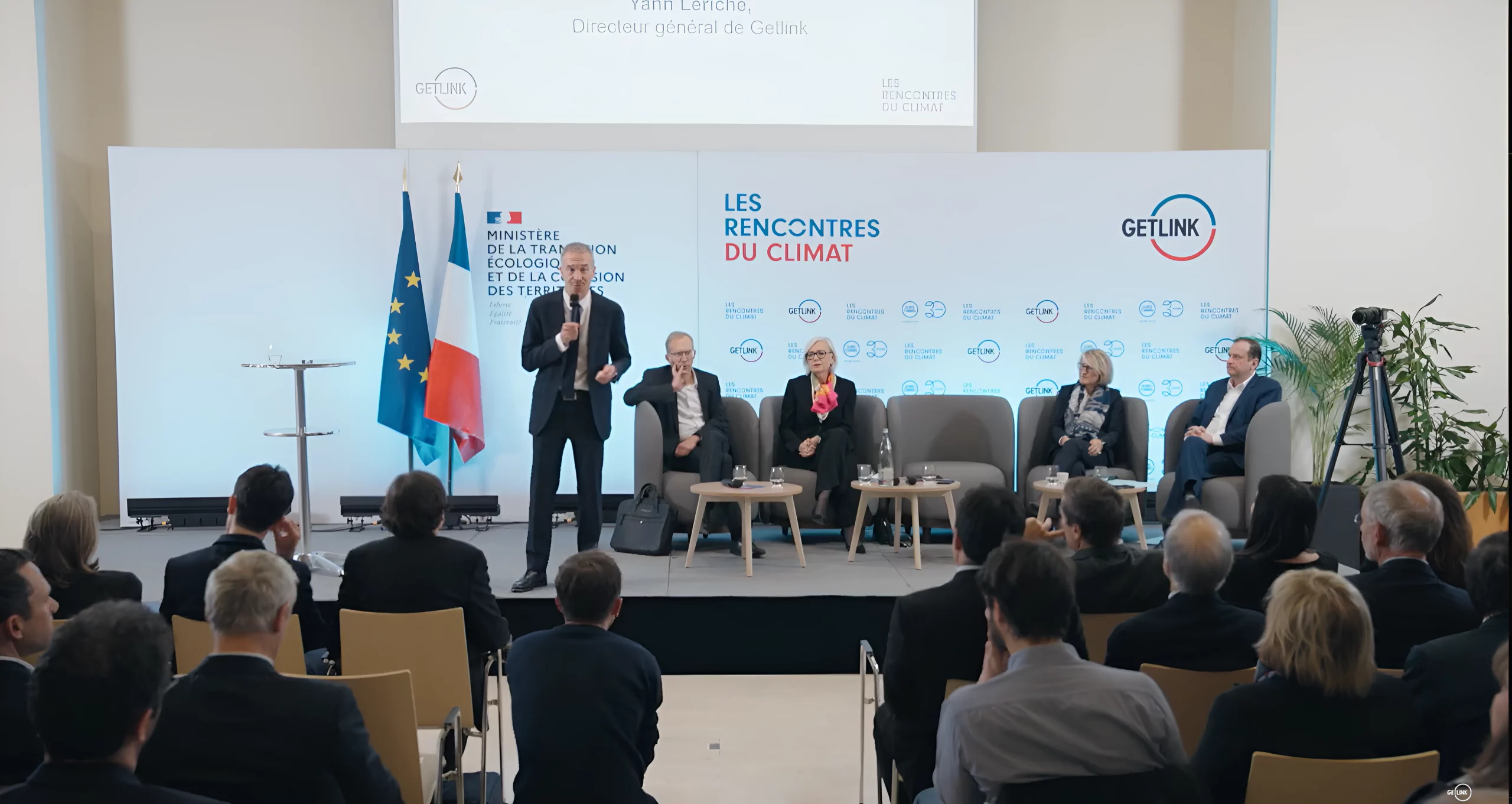Low carbon transport for everyone - the great challenge!
On 24 April, to mark the 30th anniversary of the Channel Tunnel, Getlink organised the third “Rencontres du Climate” (climate talks) session at the Ministry for Ecological Transition and Territorial Cohesion in the presence of the minister, Christophe Béchu.

Created by Getlink as part of its Toulouse School of Economics Initiative for Effective Corporate Climate Action research fellowship, the Climate Talks aim to enhance the debate on the impact of business activities on the climate, share experiences, measure the costs associated with decarbonisation efforts and propose feasible solutions.
As well as Yann Leriche, Getlink’s CEO, 200 guests were present, including the main French players in transport, mobility and logistics and the related financial and institutional ecosystems.
The debate, entitled “Low carbon transport for everyone – the great challenge!”, was preceded by an introductory address by Vincent Ducros, Getlink’s CSR and Sustainable Development Officer, inspired by the seminar organised by the Institut de l’Ecole Normale Supérieure, La transition au carrefour des crises (Transition at the crossroads of crises).
The discussions between the various participants focussed in particular on a series of measures and solutions to be undertaken to decarbonise transport. Indeed, as Yann Leriche, CEO of Getlink, pointed out in his opening remarks, “the transport sector is one of the only sectors not to have decarbonised since the 1990s”. It is therefore crucial to take action.
The debate provided an opportunity for the panellists – Yann Leriche, Gwendoline Cazenave, CEO of Eurostar, Anne Rigail, CEO of Air France, and Henri Poupart-Lafarge, Chairman and CEO of Alstom – to discuss the existing levers for triggering this “inevitable and costly” transition, as Vincent Ducros put it.
For Yann Leriche, the most important thing is not to stigmatise the transport sector: “we shouldn’t be trying to limit transport, but to limit the sector’s carbon emissions”, to avoid the risk of having “side effects” in the future such as households emitting more greenhouse gases sitting behind their computers than by travelling.

The need to make low carbon transport attractive
The issue of the attractiveness of low-carbon transport is shared by many players. According to Gwendoline Cazenave, there is a need to “reconcile the desire to travel with personal responsibility by moving away from punitive economics and offering more flexibility to travellers who choose to take the train, such as Eurostar” and by promoting intermodality and the need to promote that offer to non-European foreign tourists when they visit Europe, in particular via the Open Hubs.
Henri Poupart-Lafarge also agreed, mentioning the need to make the train more attractive and more accessible by significantly increasing traffic, with the vital proviso that “this will not be achieved without massive long-term investment”.
Attractiveness requires investment to drive innovation
The need for a sharp increase in investment was shared by the panellists, for transport in general and for freight in particular, since, as Yann Leriche indicated in his presentation, “Today in France the service offer is not of sufficiently high quality compared with road transport, and in Great Britain there is the question of standardising gauges to allow freight trains to travel from one end of Europe to the other!”
For the airline sector, the transition to low-carbon transport can only be achieved through international rather than regional rules. Anne Rigail also developed the various levers for action that can be envisaged by the sector to decarbonise air transport: innovation with aircraft that consume less fuel, intermodality with rail and sustainable types of fuel..
The cost of carbon, but at what price?
The debate focussed on the carbon tax needed for this transition and, as indicated in Yann Leriche’s article, “economists are unanimous on the need to introduce such a tax”. The advantage of opting for a tax is that, rather than using quantity as a lever to restrict the number of journeys, for example, “tax collection then enables redistribution to sectors that are struggling to decarbonise”, thus providing a more global vision of the ecological transition. For Yann Leriche, this was a key issue, because the lack of clear information on trends in the cost of carbon over the next few years is an impediment to decision-making in terms of the profitability trajectories of future investments.
For Air France, one of the challenges of the airline’s strategy was to integrate the additional costs of this decarbonisation while ensuring the long-term viability of the business and that the decision to increase prices would have to be a global solution to guarantee fair competition between players.
The French in favour of action for the ecological transition
During the debate, Frédéric Dabi analysed how the French perceive climate change and transport. The findings were clear: the climate remains a major concern for the public, with a large number of people wishing to take individual action and also placing more and more trust in business to find solutions for the ecological transition.
The debate addressed a number of issues: the cost of transition, the need to make low carbon transport attractive and accessible and the urgency of taking action. For Henri Poupart-Lafarge, the question of the number of constraints was also a key factor: according to the Chairman and CEO of Alstom, it is necessary “to have the courage to waive certain rules” to enable a rapid transition.
The debate did not therefore hold back on the challenge of decarbonising transport and making it accessible to as many people as possible with the Minister for Ecological Transition concluding the discussions.
The session concluded with the prizegiving ceremony for the Challenge for Corporate Climate Action student competition organised by Getlink and the Toulouse School of Economics, which recognised two decarbonisation projects applicable to a business by assessing the technical and financial conditions for their feasibility and impact.




